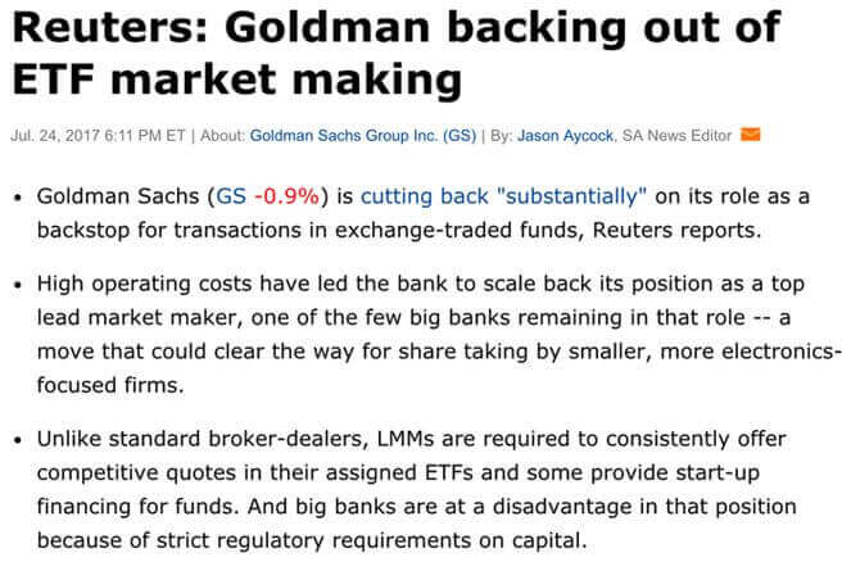ETFs – Nothing is Certain or Obvious
Howard Marks recently posted a report for clients that echoes what we’ve discussed here for many moons as regards the very misunderstood tool called an ETF.
It is sold as an easy way to access returns and exposure to the market.
Here are some excerpts from Mr. Marks note:
"Fifty years ago, shortly after arriving at the University of Chicago for graduate school, I was taught that thanks to market efficiency, (a) assets are priced to provide fair risk-adjusted returns and (b) no one can consistently find the exceptions. In other words, ‘you can’t beat the market.’ Our professors even advanced the idea of buying a little bit of each stock as a can’t-fail, low-cost way to outperform the stock-pickers.”
“John Bogle put that suggestion into practice. Having founded Vanguard a year earlier, he launched the First Index Investment Trust in 1975, the first index fund to reach commercial scale. As a vehicle designed to emulate the S&P 500, it was later renamed the Vanguard 500 Index Fund.”
“The concept of indexation, or passive investing, grew gradually over the next four decades, until it accounted for 20% of equity mutual fund assets in 2014. Given the generally lagging performance of active managers over the last dozen or so years, as well as the creation of ETFs, or exchange-traded funds, which make transacting simpler, the shift from active to passive investing has accelerated. Today it’s a powerful movement that has expanded to cover 37% of equity fund assets. In the last ten years, $1.4 trillion has flowed into index mutual funds and ETFs (and $1.2 trillion out of actively managed mutual funds).”
So, does that mean passive investing, index funds and ETFs are a no-lose proposition?
Certainly not. Consider that:
- While passive investors protect against the risk of underperforming in some case, they also surrender the possibility of outperforming.
- The recent underperformance on the part of active investors may well prove to be cyclical rather than permanent.
- As a product of the last several years, ETFs’ promise of liquidity has yet to be tested in a major bear market, particularly in less-liquid fields like high yield bonds."
Howard went on to add a few more thoughts:
"Remember, the wisdom of passive investing stems from the belief that the efforts of active investors cause assets to be fairly priced – that’s why there are no bargains to find. But what happens when the majority of equity investment comes to be managed passively? Then prices will be freer to diverge from ‘fair,’ and bargains (and over-pricings) should become more commonplace. This won’t assure success for active managers, but certainly it will satisfy a necessary condition for their efforts to be effective.”
“One of my clients, the chief investment officer of a pension fund, told me the treasurer had proposed dumping all active managers and putting the whole fund into index funds and ETFs. My response was simple: Ask him how much of the fund he’s comfortable having in assets no one is analyzing."
“Remember this too: ETFs don’t have fundamental analysts, and because they don’t question valuations, they don’t contribute to price discovery. Not only is the number of active managers’ analysts likely to decline if more money is shifted to passive investing, but people should also wonder about who’s setting the rules that govern passive funds’ portfolio construction.”
For the Record…
I don't think the message is that all ETF's are bad. I think the message is they are being greatly misunderstood as to what they can do - and what they don't do.
Let's Make Sure It Is ALL Clear…
There is no easy way to access gains, returns, hedging, risk management - or anything of the sort.
It's all tough, it all takes risk, it all causes stress if you think too-short-term, it will always make you feel like a fool at some point and at others, feeling much like our friend Homer in the picture above.
Please remember what I’ve stated here before: The Wall Street mindset can be like watching water in a bathtub.
Step 1 - get all the water on one side of the bathtub.
Step 2 - tell everyone they should be on the other side of the bathtub.
Hence, I was not at all surprised to see this note below reported yesterday - now that the whole world seems to be certain that passive, ETF management is the way to go:

Nothing is certain.
Nothing is obvious.
And when you’re told it is either, start moving (maybe even running) in the other direction.
And when you see Goldman getting away from anything that makes money - take note.
